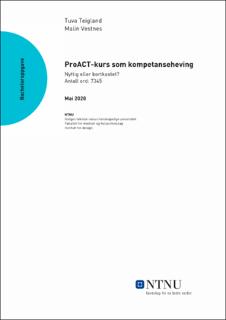| dc.contributor.advisor | Alnes, Rigmor Einang | |
| dc.contributor.author | Vestnes, Malin | |
| dc.contributor.author | Teigland, Tuva | |
| dc.date.accessioned | 2020-07-07T16:07:55Z | |
| dc.date.available | 2020-07-07T16:07:55Z | |
| dc.date.issued | 2020 | |
| dc.identifier.uri | https://hdl.handle.net/11250/2661225 | |
| dc.description.abstract | Etter samhandlingsreformen kom i 2012, er det kortere liggetid på sykehusene og dermed sykere pasienter som bor hjemme. Helsedirektoratet skrev hvordan observasjons- og handlingskompetanse blant ansatte er det mest effektive tiltaket for å oppdage forverring av pasienters somatiske tilstand.
Hensikten med denne studien er å undersøke i hvilken grad sykepleiere i hjemmebasert omsorg opplevde proACT-kurset som kompetanseheving.
Det ble brukt en kvalitativ metode med tre én-til-én-intervju. Deltakerne var fra samme arbeidsplass med en gjennomsnittsalder på 32 år og en gjennomsnittlig ansiennitet på åtte år. Intervjuene ble transkribert og analysert med systematisk tekstkondensering.
Gjennom analysen identifiserte vi fire hovedfunn. ProACT-kurset var nyttig både for nyutdannede sykepleiere, erfarne sykepleiere, men også for assistenter og helsefagarbeidere, da de ofte må bistå sykepleierne. Informantene lærte best ved simulering, men kunne likevel ikke vært foruten teori i forkant. Det ble sagt innledningsvis at oppfølgingen av kursets innhold var bra, likevel kunne ikke informantene gi en sammenfattende forklaring av de nye rutinene. Det kom også frem at mye av kunnskapen var glemt.
Funn kan tyde på at kurset i seg selv ikke er tilstrekkelig for å oppnå kompetanseheving. For å oppnå stabil kompetanse og vedlikeholde kunnskapen trengs det mengdetrening. ProACT kan føre til bedre samhandling mellom ulike instanser fordi det kan danne et felles språk. | |
| dc.description.abstract | After the collaboration reform came in 2012, there is a shorter hospital stay, thereby sicker patients living at home. The Directorate of Health wrote how observational- and action competence among employees is the most effective measure for detecting deterioration of patients somatic condition.
The aim of this study is to explore how nurses who work in home-based care experienced the proACT-course as a way to maintain and improve competency.
A qualitative method was used through individual interviews. The participants were from the same workplace with an average age of 32 years old and an average seniority of eight years. The interviews were transcribed and analyzed with systematic text condensation.
We identified four main findings through the analysis. The proACT-course was useful not only for newly trained nurses and experienced nurses, but also for assistants and health care professionals who often have to assist the nurses. The participants learned best by simulation, but could not be without the theory in advance. The participants said that the follow-up of the course content was good, but we concluded the opposite throughout the analysis because the participants could not provide the same explanations with the new routines. It was also revealed that much of the knowledge was forgotten.
The results may indicate that the course itself is not sufficient to raise competence. Volume training is needed in order to achieve stable competence and for knowledge to maintain. The proACT-course can result in better interactions within the healthcare system because it can form a common language. | |
| dc.publisher | NTNU | |
| dc.title | ProACT som kompetanseheving | |
| dc.type | Bachelor thesis | |
